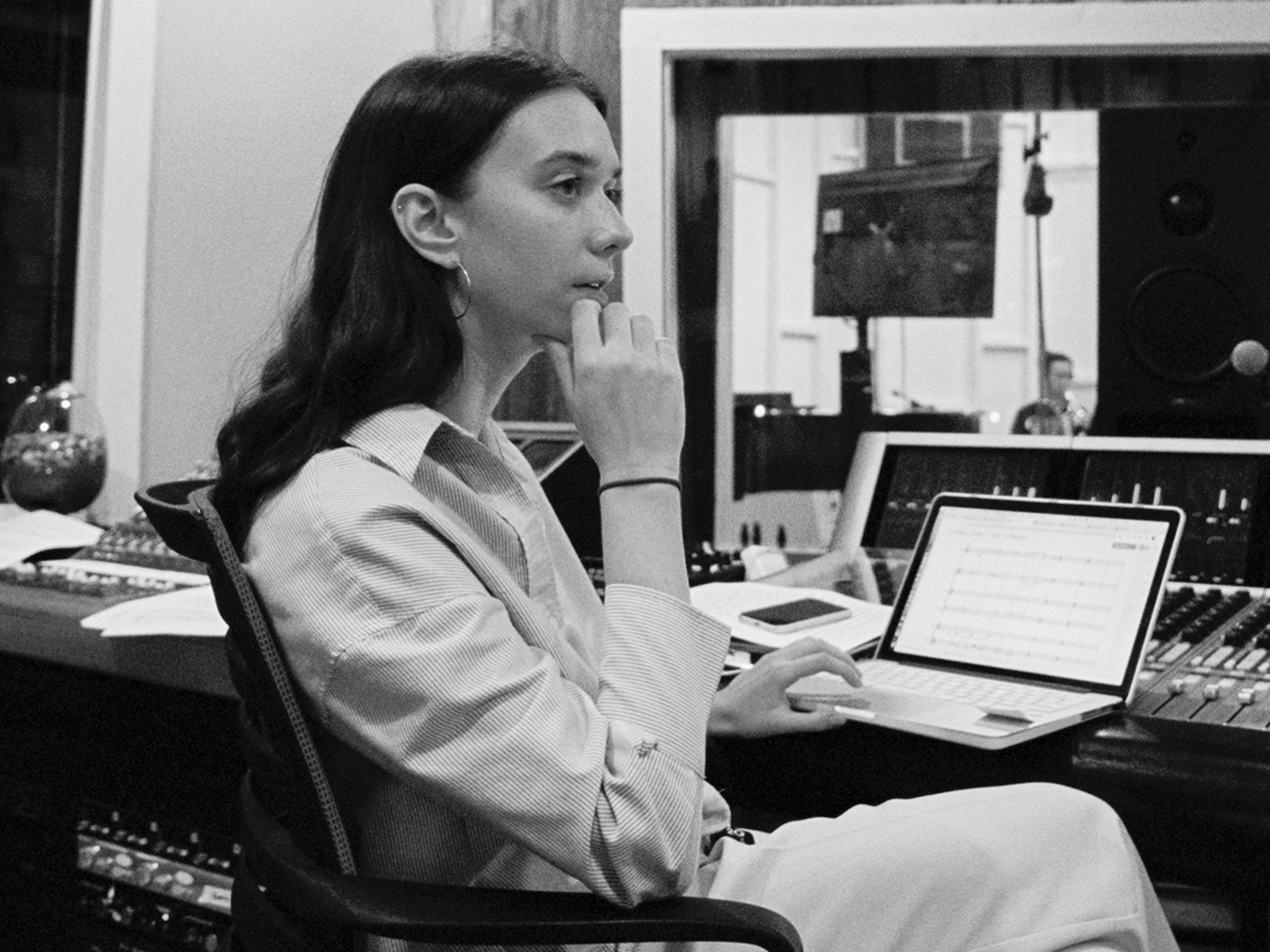
A Composer’s Path
By Sean David Christensen
Composition alum Katya Richardson discusses her immersion in the world of film scoring, a path that has led her all the way to the Oscars and back.
On the evening of Sunday, March 10, 2024—directors Ben Proudfoot (USC School of Cinematic Arts ’10) and Kris Bowers rose from their seats at the 96th Academy Awards ceremony after hearing their names called as the winners of the 2023 Oscar for Best Documentary Short Film. Smiles beaming, they walked down the aisle of the Dolby Theatre as the symphonic theme to The Last Repair Shop, arranged especially for that night, soared from the orchestra pit. As she watched them ascend the steps to accept the award, the composer heard music she arranged and wrote, based on themes by Kris Bowers, reverberating through the auditorium. Her name? Katya Richardson (‘19), Emmy Award-winning graduate of the Composition program at the USC Thornton School of Music.
These types of opportunities have a way of naturally unfolding in Los Angeles, especially through the hard work and discipline of graduates of USC Thornton. A school embedded within the entertainment industry and its intersections between the arts, culture and performance, Richardson made the most of her professional development at Thornton, an experience that helped shaped her path all the way to the Academy Awards.
With Hollywood’s biggest night this weekend, we asked Katya Richardson how her perspective on writing for film, TV and theatre has expanded since graduating from the halls of Thornton.
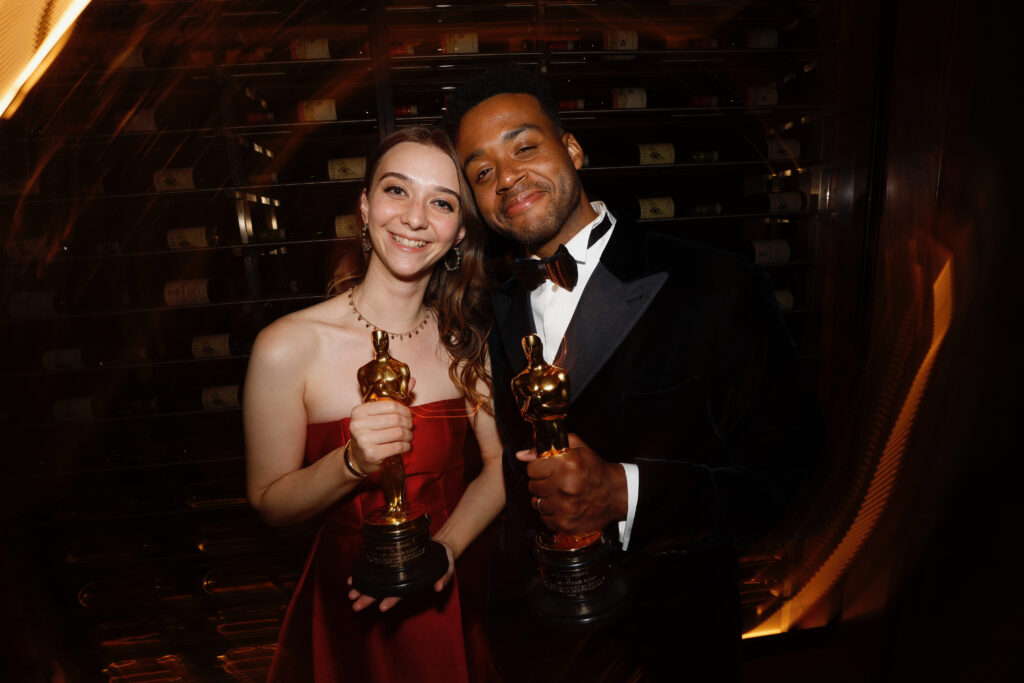
In what ways did your Composition degree prepare you for the rigors of making music in Hollywood?
To be honest, I’ve always felt like a little bit of an outsider, not having gone through a traditional Film Scoring degree. Many of the technical aspects of our craft I learned on the job. But we are lucky to have so many free tools at our fingertips! Although these skills come with a bit of a learning curve, the resources are out there. On the other hand, I believe that classical composition and traditional counterpoint is more difficult to absorb on your own and takes years of practice and study. Looking back on my time at USC, I genuinely believe that a classical degree at Thornton prepared me to be a better musician and crave deeper conversations about all kinds of music. Many of the exchanges I had with my professors were about translating sound or musical concepts into notation. In film-scoring, composers must translate emotion and narrative into music, so on a philosophical level, the parallels are very much there. But from a more macro perspective, developing a strong foundation in music history and literature, made me a more informed composer and increased my awareness of where I stand in dialogue with centuries of music-making. I like to think that film scoring is all about wearing different musical hats—we often have to immerse ourselves seamlessly into various styles, whether it be rock or big band. Learning the intricacies of orchestration and the limits of what an instrument can do, made me better understand how to write for every instrument in the orchestra and approach writing in different genres with more confidence.
What processes as a composer did you learn at Thornton that later came to be the most helpful in your screen-scoring career?
I greatly appreciated the access to live musicians during my time at Thornton. Composers are nothing without musicians! A large part of our Composition degree revolved around workshops and performances, and that facetime with musicians, the opportunity to experiment and try new things (and then inevitably go back to the drawing board!) was invaluable. Whenever possible, I try to bring that same process into my film-scoring work. When programming MIDI, it’s easy to lose sight of what’s playable because mockups make everything sound great, but keeping in mind who you’re writing for, or approaching composition from an orchestrational mindset, has been incredibly useful in my own work.
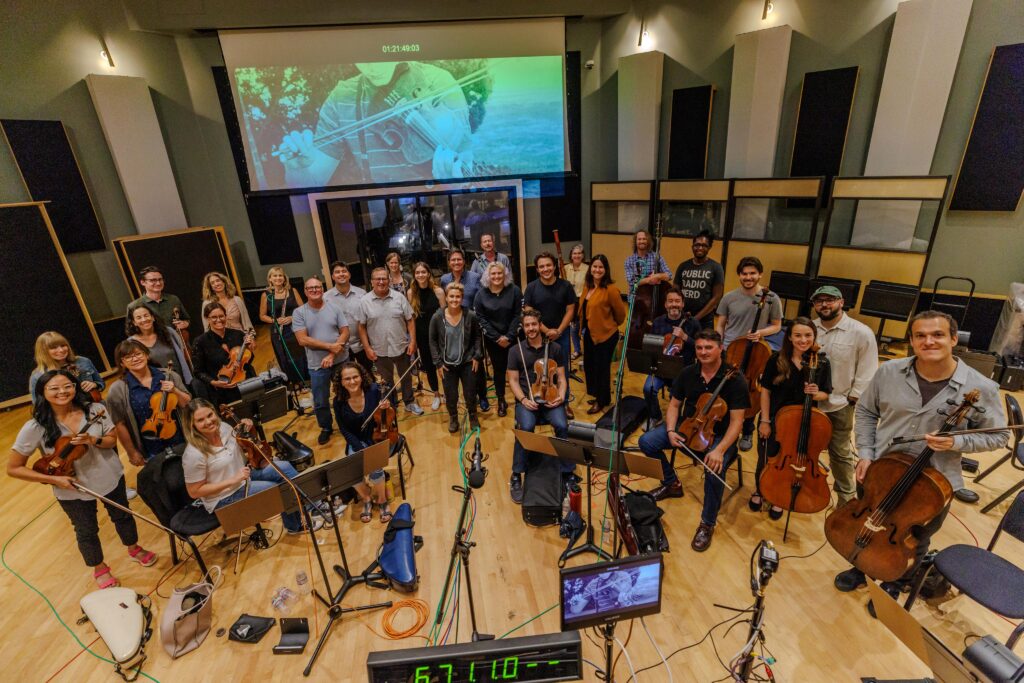
How did your Hollywood career get started after graduation? What was the process like connecting with other composers and filmmakers?
The kernels of my film-scoring career started right at the beginning of college! One of my very first memories at USC was on a field trip, sharing an earbud on a bus with a girl (now my housemate!) listening to Ennio Morricone scores. I was always a huge film and film music nerd, so I quickly made friends with film students in my classes, eventually pursuing a Cinema minor in addition to music. I wanted to surround myself with like-minded people, and many of the director friends I made in college are the same people I continue to collaborate with.
As a freshman, I had absolutely zero clue how to start film scoring; it all seemed so daunting! I downloaded Logic and offered to score friends’ projects with the built-in Logic sounds. I said yes to every opportunity to be involved in film, whether it was orchestrating a friend’s score or playing piano in a session. At the same time, I also began internships and studio positions working with several established Hollywood composers. Admittedly, balancing work and school proved to be challenging, but it was incredible to have these opportunities. By the time I was graduating, I already had a strong sense of community and consistent work scoring friends’ films and part-time assisting. Having made these industry connections while still in school helped smooth the transition to being freelance.
How did you become involved with The Last Repair Shop? What was your career path that led you to that project?
Getting the chance to be a part of The Last Repair Shop and collaborate with Kris Bowers was a dream come true; many stars aligned for this project to happen. Being from Southern California, much of my musical development came from living in LA, so I’m very thankful to have had the opportunity to express gratitude to my musical mentors and pay homage to the beautiful and inspiring city of Los Angeles.
The career path that led me here was a very unexpected one! I’ve always loved film scores and was fortunate to grow up in a musical family. My father is a trumpeter, and my earliest memories are of going to jazz clubs and concerts. At age 8, I started learning piano, but quickly became interested in improvisation. A few years later, I was very lucky to be a part of the LA Phil Composer Fellowship Program. It was through this incredible program that I decided to pursue composition as a career, and while attending USC, I began scoring student films and working as a studio assistant.
I first heard of Kris and Ben’s work together on a short they co-directed called A Concerto is a Conversation. I’d been a fan ever since and was excited to discover that they were co-directing another film. Ben and I first connected through a mutual friend from my time at USC. One of my director friends from college was an editor on A Concerto is a Conversation, and in 2022, Ben heard some of the previous work I’d done with him. Since then, Ben and I have collaborated on several other shorts for Breakwater Studios such as MINK! and The Best Chef in the World, and I am their current Composer-in-Residence.
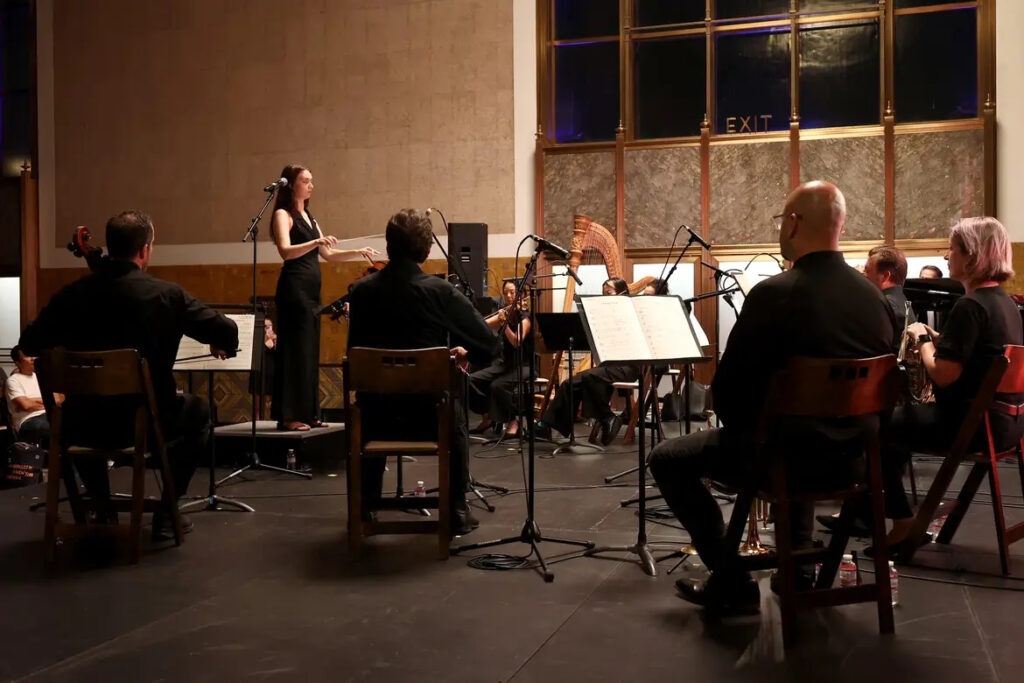
Describe the experience being part of that film’s Oscar campaign that year. What was it like attending the Oscars?
Seeing how many people were affected by the film and continue to be, has been such a gift to witness, especially since composers aren’t often a part of a campaign, particularly for a short film! As with any documentary, our goal with this film was to showcase the incredible stories of our subjects and to celebrate the fact that this instrument repair program exists in LA—I knew it was a very special film and story, but never in my wildest dreams did I think it would take us all the way to the Oscars. It’s so meaningful that our team’s work was acknowledged in this way and I’m thankful that the Oscars campaign provided a huge platform for our story to be shared, but ultimately the most rewarding part was knowing that a project I worked on had a personal impact on a community—-a community I call home. Being a part of a project with real impact is one of the most rewarding experiences as a composer.
And of course, attending the Oscars was a day I’ll never forget; seeing Emma Stone and Spielberg walking around, and realizing that they’re real people, was so surreal! It was very special to be in a room full of creative people and celebrate artists at the top of their craft. I was lucky to get to go and share that day with my filmmaking team.
The Oscars were also particularly meaningful because I was a part of the music arranging team that year. I helped arrange music from all the nominated films’ scores, which included the music from The Last Repair Shop. Of course, I had no idea whether or not we would win, so I wasn’t sure if the play-on would even be performed. Getting to hear my music played on such a large scale was awe-inspiring and extremely validating.
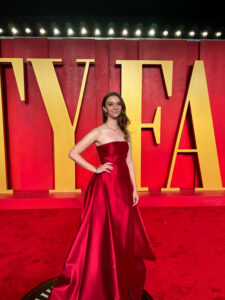
What career advice would you give to composers just graduating from USC Thornton looking to work in the film industry?
My advice is two-fold: firstly, there is no “right” path in music. What I deeply admire about the composers I’ve worked with is that they’ve each built their careers by simply being themselves. If we embrace our unique backgrounds and create music genuine to us, there is space for all of our voices to create and be heard. Filmmakers approach composers like Kris Bowers because they want to work with them for who they are as people and as musicians. That lesson has been invaluable in grounding myself and the music I make.
Going hand-in-hand with finding your voice is immersing yourself in things that interest you. Attend film screenings and composer events, and become an active part of the community you aspire to be in. Strive to continuously improve your craft by studying your favorite scores or scenes from movies and be open to any opportunity related to music. There is no single path to success, and more often than not, skills outside of composition, such as orchestrating or performing on a friend’s score, can only enhance your strength as a musician and composer. If a friend asks you to try writing a song or a musical, what’s the harm in saying yes? You’ll only learn more about yourself and the limits you’ve set for yourself. And in my experience, you may not realize your full potential until you are put to the test.
Featured story photo by Dimitri Tzoytzoyrakos


